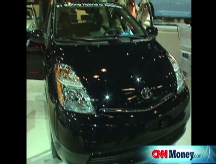Detroit in the ditch
Big Three automakers won huge savings in labor contracts late last year but slumping sales will likely lead to another year of losses.
| 36 month new | 5.91% |
| 48 month new | 5.98% |
| 60 month new | 6.03% |
| 72 month new | 3.78% |
| 36 month used | 6.31% |
NEW YORK (CNNMoney.com) -- This was supposed to be a good year for Detroit's Big Three.
General Motors (GM, Fortune 500), Ford Motor (F, Fortune 500) and Chrysler LLC all struck new labor pacts with the United Auto Workers union last year. That was expected to help the automakers cut billions of dollars in costs and move them back towards profitability after years of losses.
So much for that.
Instead, sales have been battered by a combination of high fuel prices and a slowing economy.
Ford will report its first-quarter results Thursday and is expected to post its seventh loss in the past eight quarters. GM is forecast to report its second largest operating loss since the start of 2006 when its results come out.
Both companies are expected to bigger losses this year than last year. Privately-held Chrysler LLC does not report results.
"There's tremendous uncertainty in the market right now, and most is related to the state of the economy," said David Cole, chairman of the Center for Automotive Research. "This is shaping up as a rotten year."
Overall, U.S. auto sales in the first quarter tumbled 8% from a year ago and the Big Three continued to lose market share as their sales fell even more than their competitors.
Bob Schulz, the senior automotive credit analyst for Standard & Poor's, said the downturn is "gathering speed" and warned that sales could fall as much this year as the combined 7% decline from their peak in 2000 through last year.
The automakers and most forecasters have slashed their sales targets, with several now forecasting sales to fall 15 million vehicles for the first time since 1995. And research firm CNW said that its figures show new vehicle deliveries in the first half of April trail year ago deliveries by 10.6%.
"Adding insult to injury, even those who are buying new vehicles are opting for less expensive models in April than in March," said CNW in a report. CNW added that dealerships are reporting a rising percentage of lenders rejecting loan applications.
"Making the job harder for new-car dealers are the number of institutions needing to be shopped to find a lender, even for the high credit-rating customers," said the report.
The only good news for the Detroit automakers is that the pain is now spreading beyond the traditional Big Three to some of the Asian and European automakers as well.
Toyota Motor (TM), Hyundai and BMW all saw their U.S. sales fall sharply so far this year.
"It doesn't help the U.S. automakers, but at least it means they don't have to bear the brunt of the downturn," said Bob Schnorbus, chief economist for JD Power & Associates.
But the overseas automakers have much better cash positions than their U.S. rivals, as Ford and GM have been running up losses in their core North American auto operations since 2005, while Chrysler was dumped by its former parent, Daimler, last year after mounting losses there.
Industry experts believe that the Detroit automakers will eventually see the advantages of the new labor deals, although some of the bigger savings won't take effect until 2010.
And the weak labor market could hurt the Detroit automakers' efforts to get thousands of highly-paid senior autoworkers to accept buyout packages so they can be replaced by lower-wage new hires.
"The contract should still be a huge positive for them longer term," said Schulz. "But given the economic outlook, it appears the take rate on this attrition plan won't be as great as the previous one."
So far GM and Ford have been helped by strong sales in overseas markets, particularly China and Brazil. But Erich Merkle, vice president of forecasting for auto consultant IRN said that the problems in the U.S. economy are likely to spread to those stronger markets, perhaps by the end of this year.
"To some folks that may sound ludicrous to say a fast growing market like China could be shrinking by the end of the year," said Merkle. "But China's economy is still tied very much to the US economy through its exports. Eventually the weakness we're seeing here will spread to the rest of the world." ![]()




